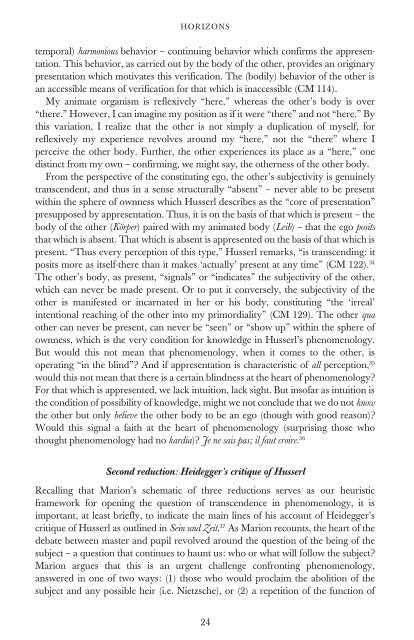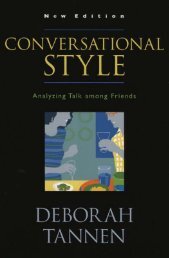Speech and Theology: Language and the Logic of Incarnation
Speech and Theology: Language and the Logic of Incarnation
Speech and Theology: Language and the Logic of Incarnation
Create successful ePaper yourself
Turn your PDF publications into a flip-book with our unique Google optimized e-Paper software.
HORIZONS<br />
temporal) harmonious behavior – continuing behavior which confirms <strong>the</strong> appresentation.<br />
This behavior, as carried out by <strong>the</strong> body <strong>of</strong> <strong>the</strong> o<strong>the</strong>r, provides an originary<br />
presentation which motivates this verification. The (bodily) behavior <strong>of</strong> <strong>the</strong> o<strong>the</strong>r is<br />
an accessible means <strong>of</strong> verification for that which is inaccessible (CM 114).<br />
My animate organism is reflexively “here,” whereas <strong>the</strong> o<strong>the</strong>r’s body is over<br />
“<strong>the</strong>re.” However, I can imagine my position as if it were “<strong>the</strong>re” <strong>and</strong> not “here.” By<br />
this variation, I realize that <strong>the</strong> o<strong>the</strong>r is not simply a duplication <strong>of</strong> myself, for<br />
reflexively my experience revolves around my “here,” not <strong>the</strong> “<strong>the</strong>re” where I<br />
perceive <strong>the</strong> o<strong>the</strong>r body. Fur<strong>the</strong>r, <strong>the</strong> o<strong>the</strong>r experiences its place as a “here,” one<br />
distinct from my own – confirming, we might say, <strong>the</strong> o<strong>the</strong>rness <strong>of</strong> <strong>the</strong> o<strong>the</strong>r body.<br />
From <strong>the</strong> perspective <strong>of</strong> <strong>the</strong> constituting ego, <strong>the</strong> o<strong>the</strong>r’s subjectivity is genuinely<br />
transcendent, <strong>and</strong> thus in a sense structurally “absent” – never able to be present<br />
within <strong>the</strong> sphere <strong>of</strong> ownness which Husserl describes as <strong>the</strong> “core <strong>of</strong> presentation”<br />
presupposed by appresentation. Thus, it is on <strong>the</strong> basis <strong>of</strong> that which is present – <strong>the</strong><br />
body <strong>of</strong> <strong>the</strong> o<strong>the</strong>r (Körper) paired with my animated body (Leib) – that <strong>the</strong> ego posits<br />
that which is absent. That which is absent is appresented on <strong>the</strong> basis <strong>of</strong> that which is<br />
present. “Thus every perception <strong>of</strong> this type,” Husserl remarks, “is transcending: it<br />
posits more as itself-<strong>the</strong>re than it makes ‘actually’ present at any time” (CM 122). 34<br />
The o<strong>the</strong>r’s body, as present, “signals” or “indicates” <strong>the</strong> subjectivity <strong>of</strong> <strong>the</strong> o<strong>the</strong>r,<br />
which can never be made present. Or to put it conversely, <strong>the</strong> subjectivity <strong>of</strong> <strong>the</strong><br />
o<strong>the</strong>r is manifested or incarnated in her or his body, constituting “<strong>the</strong> ‘irreal’<br />
intentional reaching <strong>of</strong> <strong>the</strong> o<strong>the</strong>r into my primordiality” (CM 129). The o<strong>the</strong>r qua<br />
o<strong>the</strong>r can never be present, can never be “seen” or “show up” within <strong>the</strong> sphere <strong>of</strong><br />
ownness, which is <strong>the</strong> very condition for knowledge in Husserl’s phenomenology.<br />
But would this not mean that phenomenology, when it comes to <strong>the</strong> o<strong>the</strong>r, is<br />
operating “in <strong>the</strong> blind”? And if appresentation is characteristic <strong>of</strong> all perception, 35<br />
would this not mean that <strong>the</strong>re is a certain blindness at <strong>the</strong> heart <strong>of</strong> phenomenology?<br />
For that which is appresented, we lack intuition, lack sight. But ins<strong>of</strong>ar as intuition is<br />
<strong>the</strong> condition <strong>of</strong> possibility <strong>of</strong> knowledge, might we not conclude that we do not know<br />
<strong>the</strong> o<strong>the</strong>r but only believe <strong>the</strong> o<strong>the</strong>r body to be an ego (though with good reason)?<br />
Would this signal a faith at <strong>the</strong> heart <strong>of</strong> phenomenology (surprising those who<br />
thought phenomenology had no kardia)? Je ne sais pas; il faut croire. 36<br />
Second reduction: Heidegger’s critique <strong>of</strong> Husserl<br />
Recalling that Marion’s schematic <strong>of</strong> three reductions serves as our heuristic<br />
framework for opening <strong>the</strong> question <strong>of</strong> transcendence in phenomenology, it is<br />
important, at least briefly, to indicate <strong>the</strong> main lines <strong>of</strong> his account <strong>of</strong> Heidegger’s<br />
critique <strong>of</strong> Husserl as outlined in Sein und Zeit. 37 As Marion recounts, <strong>the</strong> heart <strong>of</strong> <strong>the</strong><br />
debate between master <strong>and</strong> pupil revolved around <strong>the</strong> question <strong>of</strong> <strong>the</strong> being <strong>of</strong> <strong>the</strong><br />
subject – a question that continues to haunt us: who or what will follow <strong>the</strong> subject?<br />
Marion argues that this is an urgent challenge confronting phenomenology,<br />
answered in one <strong>of</strong> two ways: (1) those who would proclaim <strong>the</strong> abolition <strong>of</strong> <strong>the</strong><br />
subject <strong>and</strong> any possible heir (i.e. Nietzsche), or (2) a repetition <strong>of</strong> <strong>the</strong> function <strong>of</strong><br />
24



